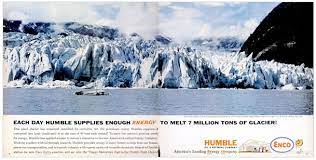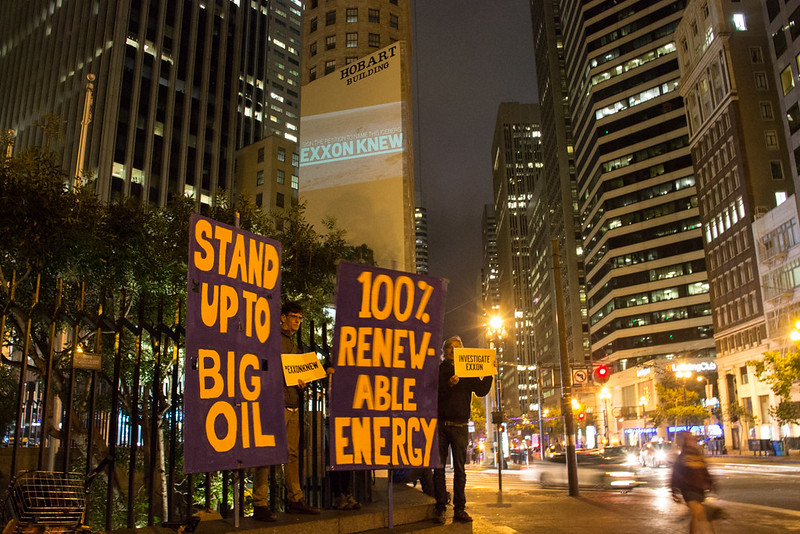 The state of California is suing five of the world’s biggest oil companies.
The state of California is suing five of the world’s biggest oil companies.
On September 15, Governor Gavin Newsom and Attorney General Rob Bonta announced the civil lawsuit against Shell, BP, ConocoPhillips, Chevron, and ExxonMobil.
The case accuses the companies of deceiving the public about fossil fuels’ impact on climate, despite being aware of such risks for decades.
Let’s take a closer look.
Undermining Climate Science
The lawsuit’s defendants (oil companies) have a long history of publicly denying the effects of climate change. In 1959, oil executives were warned about the potential long-term impacts of fossil fuels on global warming.
 Just three years later, however, Humble Oil, the company now known as ExxonMobil, deliberately cast doubt on this finding. One advertisement proclaimed: “Each day Humble supplies enough energy to melt 7 million tons of glacier!”
Just three years later, however, Humble Oil, the company now known as ExxonMobil, deliberately cast doubt on this finding. One advertisement proclaimed: “Each day Humble supplies enough energy to melt 7 million tons of glacier!”
Since then, ExxonMobil conducted internal studies and obtained scientific evidence of climate change as early as 1979. Exxon’s climate models were sometimes even more accurate than contemporary ones developed by scientists! Read more in this Youngzine article.
The other defendants in the lawsuit have continued to question the scientific consensus as well. They have suggested that Earth is cooling down rather than heating up. BP, in particular, first coined the concept of a carbon footprint in a marketing campaign that ran from 2003 to 2006. This displaced blame from oil executives onto consumers themselves, who were made to feel as if their lifestyles contributed more to global warming.
In addition, these companies have emphasized threats to the economy while downplaying global warming. Such marketing has even swayed prominent politicians.
Greenwashing Tactics
 Contrary to what its name suggests, the Global Climate Coalition (GCC) is a representative for oil and gas companies along with other extractive industries.
Contrary to what its name suggests, the Global Climate Coalition (GCC) is a representative for oil and gas companies along with other extractive industries.
In the 1990s, the GCC’s marketing campaign appealed to America’s future and criticized the ongoing Kyoto Protocol Negotiations. This pushed then-president George W. Bush to reject the Kyoto Protocol, which established an international treaty on reducing emissions.
More recently, oil companies have adopted flashy campaigns that point to greenwashing -- where the companies showcase a veneer of change while continuing their destructive practices. For instance, Shell claimed to have made major contributions to the development of clean energy sources. One ad shows an executive amidst solar and wind farms. In truth, from 2010 to 2018, 98.7% of Shell’s investments have remained in oil and gas!
Meanwhile, BP's rebrand from “British Petroleum” to “Beyond Petroleum” masks deliberate disinformation and its claims that methane and natural gas are “clean” energy sources. These false claims hurt the credibility of real climate science and mislead policy discussions.
What Does the Lawsuit Entail?
In recent years, California has been hit especially hard by natural disasters -- from heatwaves to droughts and wildfires. Climate change has played a likely role in exacerbating these catastrophic events.
The lawsuit demands that the five companies foot the bill. Governor Newsom and Attorney General Bonta are seeking the creation of a recovery fund based on the companies’ profits. Proceedings from this fund would go towards damages incurred by these natural disasters and the billions of dollars in government losses. Furthermore, they are looking to penalize oil companies for their long-standing deception of the public for their financial gain.
The case, which was filed in San Francisco Superior Court, is a sign that climate awareness is spurring influential institutions to action. The trials and the outcomes will be watched closely and could set a precedent for more such lawsuits.
Sources: NY Times, KQED, Guardian, NPR, Reuters, CA.gov








